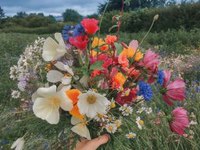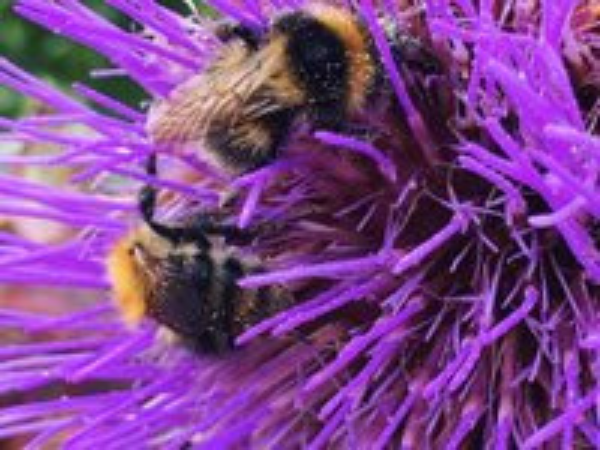Everyone knows the basics of being vegan; no meat, no dairy, no eggs. However, there is one other ingredient which often gets overlooked: honey. With our spring box being inspired by bees, I have done some research and shared my thoughts on the topic.
THE TRUTH BEHIND INDUSTRIAL BEEKING
So why is there so much confusion over bees? Well firstly, misinformation. We are often led to believe that honey farmers only take the "overflow" but that isn't always the case.
Bees work extremely hard all summer pollinating approximately 20 million flowers per colony, per day. A typical hive contains over 30,000 bees in the summer and 5,000 in the winter. They collect this nectar to create a vital winter food store for their colony. Sadly, it is a well documented fact that many industrial bee farms will take the entire food store and replace it with a sugar substitute.
Why is this bad? Simply put, bees need the nutrients from honey just as much, if not more, than we do. Honey is full of amazing protective properties, antioxidants and antibiotics, without which, bees are more susceptible to disease and pesticides, leading to a decline in numbers.
Other unethical practices conducted by many industrial bee farms include culling hives during winter to lower costs, selective breeding and clipping the Queen bees wings to prevent her leaving the colony and starting a new one elsewhere.
WHY ARE BEES IMPORTANT AND HOW I CAN HELP
Bees are vital to our survival. It is incredible that such a small creature can make such a huge impact on human life but without bees our food supplies would rapidly decline. It is estimated that one third of the worlds food supply relies on bees and I think that is pretty incredible!
Another huge problem for bees is a change in land use and habitat loss. In the UK we have developed a monocultural approach to farming; which means vast amounts of land are stripped of their trees, meadows and woodland to create a space for one type of crop at one time.
Bees need variety and one of the best ways we can help the little guys out is by creating bee friendly spaces with biodiversity. However big your garden, you can still do your part by planting flowers-a-plenty! There are a few simply rules to follow and they include: no pesticides, less weeding and never spray open flowers! Another thing to consider is creating rest space and a water source for bees, especially during the hot summer days.
Buying more organic food also helps! Organic food reduces the amount of pesticides used which will help bees in the long run as they will be less sceptical to picking up harmful pesticides whilst pollinating crops.
Lastly, if you are able to keep bees then do! The practice of conservation beekeeping means that no honey is taken from the hives and bees are left alone, meaning that this method is entirely vegan.

HOW CAN A VEGAN LIFESTYLE HELP?
Commercial beekeeping needs to end. Taking away the demand for such products will help reduce the quantity being harvested. You should also be aware of all non vegan by-products such as beeswax, propolis, royal jelly, and their other names such as cera alba and E901 (both names for beeswax on food labels).
Eat vegan honey instead! Yes that's right, vegan honey is readily available on the market and it is delicious! Spread the word about this delightful alternative and encourage your friends and family to try this instead.
Where do you stand on honey and did you learn anything new from this post? Let us know in the comments below.
In our next post I will discuss bee ingredients in beauty products and talk to you about the bee alternative products in our amazing Spring box: BEE KIND.
To note: all of the information for this blog post has been researched and collated from reliable sources. Not all industrial bee farms will use unethical practices however many do, I urge you to conduct your own research if you do decide to continue to consume honey to ensure you are aware of their practices.
Explore our boxes!
Note: this blog was written by Megan Sharp @sharp_socials






